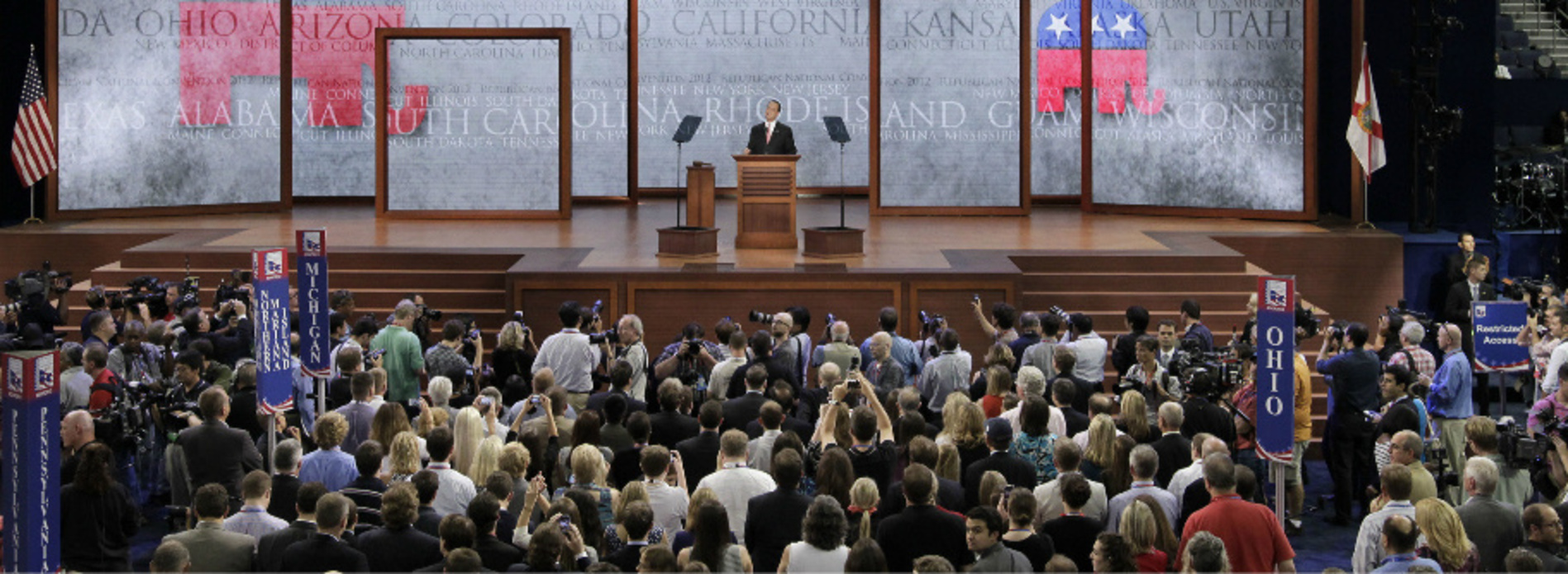Monday, January 11, 2016
A Brokered Convention for the Republicans?
Is there likely to be a brokered convention for the Republicans in 2016? It’s too early to say. The media have paid a great deal of attention to polling data based on various sets of respondents – likely voters, registered primary voters, previous caucus participants (e.g. in Iowa), and others. Although poll results appear relatively consistent, with Donald Trump generally leading the Republican race and Hillary Clinton leading the Democratic race, no caucus or primary has yet been held, and there are not yet any results to report. The convention is still more than half a year away, and candidates will be campaigning across the primary season in scores of states.
What might lead to a brokered convention? First, consider who goes to the convention and how they get there. The Republican National Convention (RNC) consists of 2,470 delegates, selected from the fifty states, the District of Columbia, Puerto Rico, and US territories. These delegates are selected either through state caucuses or through primary elections. A potential presidential nominee will organize a slate of delegates, pledged to support him or her, to run in a state party caucus or primary election. Such candidates will vet their delegate slates carefully, to ensure that loyal supporters appear on their slate. Although the potential presidential candidate’s name is usually the only name that appears on the primary ballot (it is unlikely that a primary election voter will see a list of delegates for each presidential nominee), primary voters are actually voting for the delegate slate pledged to the candidate.
These delegates are important, of course, because they attend the national convention and their votes eventually will determine the Republican Party’s presidential candidate. They are also important, however, because of how the RNC’s rules govern their behavior. The delegate selection process, with delegates pledged to specific candidates, intersects with RNC nominating rules to create an opportunity for a brokered convention.
Three rules might facilitate a brokered convention. Rule #1: RNC rules require convention delegates to support, on the first nominating ballot, the candidate to whom they were pledged when they themselves were selected as delegates. Rule #2: The RNC requires that a candidate win a majority of delegate votes, or 1,236, to become the Republican presidential nominee. A race involving only two competitive candidates for nomination will always produce a majority (in the absence of a highly unlikely tie), but a race involving three or more competitive candidates makes achieving a majority vote more problematic.
Because delegates are bound on the first convention vote to support the candidate to whom they were pledged, a first vote split among several competitive contenders could fail to produce a single candidate with a majority of the delegate votes. Should this occur, no candidate has won the nomination. Moreover, delegates are released from their binding obligations and are free to support any candidate in subsequent rounds of voting.
Delegates, free from their binding commitment to a candidate, however, are unlikely to abandon that candidate and to do as they please. Because delegates, in their own selection contest, were vetted by the candidate to whom they were pledged, and because delegates have loyalty and general commitment to their preferred candidate (and to their state party and other elected party officials), they are likely to use their power – even if not the power to elect their preferred nominee – to bargain with other delegate groups. A candidate delegation, or a state delegation, that controls only several dozen votes, may find itself empowered when it joins with another, or other, delegations to support a shared alternative candidate. Delegates, strategically and politically tied to their candidate, become chips in a bargaining game among likely candidates, none of whom yet controls a majority of delegate votes. The candidates (more conventionally, their advisors, campaign attorneys, and other party elites) engage in bargaining and trade-offs, as each candidate’s team works to construct a majority of delegates.
The highest support any candidate has had (thus far) in polling has been 36.5 percent, by Donald Trump, the front-runner in opinion polls. This is, however, far short of the majority necessary for nomination on the first ballot, because 63.5 percent of those polled support someone else. Those 63.5 percent have not rallied around a single alternative candidate – but they could. They could do so because of Rule #3.
Between March 1 and March 14, states must allocate delegates to candidates on a proportional representation basis; that is, candidate delegates are awarded proportionately to the percentage of candidate vote won. Twelve states will hold simultaneous selection events on “Super Tuesday,” March 1, selecting on that single day 632 delegates – more than half the number necessary to win the Republican presidential nomination. By March 14, 979 delegates will have been selected and allocated amongst the various Republican presidential hopefuls by proportional representation. Nine of the Super Tuesday states will hold primary elections, with rules that set a threshold above which candidates must rise in order to receive any delegates whatsoever (except for Virginia, where there is technically no threshold). Eight of these Republican primary election states also have winner-take-all provisions, once a candidate surpasses a majority (or, in the case of Tennessee, a super-majority of 67 percent). In these cases, any candidate who passes the threshold wins 100 percent of the delegates.
Comparative political scientists know that proportional representation, in awarding seats proportional to votes received, rewards small parties as well as large parties, and often positions small parties to trade off their support for (potentially much) larger benefit to themselves. That logic is likely to hold for the Republicans during the 2016 primaries. No single candidate is likely to win every single delegate allocated by proportional representation, and thus far no Republican primary candidate is polling at 50 percent, making winner-take-all outcomes unlikely. Instead, several candidates are likely to win some delegates. In some races, in some states, several candidates may pass the entry threshold – and, once passed, such candidates are likely to stay in the race. Why would a candidate with only a small number of delegates leave the race when he (or Carly Fiorina) could arrive at the RNC in Cleveland with the handful of delegates that could determine the outcome? Or become, in bargaining among all the candidate delegations, the eventual nominee? Or guarantee being selected as the vice presidential candidate? Any candidate with even modest funding (or generous funding from a single donor) and only a modest number of delegates could stay in the race for the duration, hoping for substantially bigger influence at the convention itself. Several such candidates – those who have some delegates but not enough to win the nomination – could secure enough delegates amongst themselves to deprive a frontrunner of the majority necessary to win the nomination.
Is the 2016 RNC likely to be brokered? It’s too early to say. But it’s not too early to say that, with multiple candidates in the race, with campaign funding that permits candidates to stay in the race, and with proportional representational allocation of delegates, the RNC rules make it possible.






